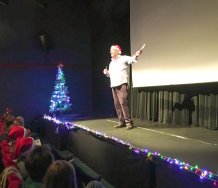
Professor Brendan Godley at a previous Science of Christmas
Christmas dinner a ‘global feast’
Christmas dinner is an international evolutionary feast – with only the humble carrot native to British soil, a leading scientist says.
Global trade and domestication over thousands of years account for everything else, from turkey and bacon to potatoes and parsnips.
Professor Dave Hodgson, of the University of Exeter, will explain the origins of Britain’s favourite festive foods at the Science of Christmas, a family-friendly event in Falmouth on Thursday (6 December).
Other talks will include “Why can’t Rudolph find his carrots?” and “Is Santa naughty or nice?”
Professor Hodgson said: “Of all the animals and plants that appear on the traditional Christmas dinner plate – turkey, bacon, cabbage, Brussels sprouts, broccoli, cauliflower, swede, parsnip, carrot, potato, chestnut, cranberry – only the carrot is a British native, and the carrot we eat bears almost no resemblance to its wild ancestor.
“Turkeys are from America, pigs are from Turkey, potatoes from Peru and our cabbages are from the Mediterranean.
“All of our food species have been bred to be edible, large, colourful and very different from their wild ancestors.
“Christmas Dinner really is a truly global, evolutionary feast.”
Also at the Science of Christmas:
- Who ate all the (mince) pies? How Santa lives a long and healthy life despite his diet (Dr Rebecca Boulton): Santa would have a much easier time if he lost a few stone. Getting down the chimney would be less hassle, and let’s not forget about the poor reindeer having to lift a 200kg human. Or is he human? A rogue elf seeks to uncover the truth about Santa's genetics and spread the word about what's really going on at the North Pole.
- Are parents slower than their kids at unwrapping Christmas gifts? (Dr Neeltje Boogert): Why do we bother wrapping presents? It turns out this tradition has been around for many centuries, and many animals experience similar excitement and challenges when trying to reach nature’s gifts. We'll explore unwrapping strategies across the animal kingdom, and find out who is the best at unwrapping gifts.
- Will Santa have any snow in future? (Dr Stephan Harrison): Maps and photographs will show how much the Arctic is warming and what might happen in the future due to greenhouse gases. What does this mean for snowfall at Santa’s home? Well, because warmer air holds more water vapour than dry air, global warming might make the Arctic snowier.
- Why can’t Rudolph find his carrots? (Professor Martin Stevens and Maria Watson): Christmas is a colourful, downright gaudy time of year, but how does it look to the reindeer pulling Santa’s sleigh? Can the other reindeer even see Rudolph’s red nose? The speakers will explain how the world we perceive is a product of our vision and our brain, and what this means for Christmas.
- Is Santa naughty or nice? (Energy Policy Group): Santa wants to halt global warming by stopping his tradition of giving coal to naughty children. But he's been offered a “deal” by a famous American coal supporter. Should Santa take the deal, or save the planet – the children have to decide.
The Science of Christmas is on Thursday at 7pm at the Poly in Church Street, Falmouth.
The event is currently full. To join the waiting list in case of any cancellations, visit http://ex.ac.uk/thescienceofchristmas2018
The speakers, from the University of Exeter’s Penryn Campus, promise to uncover some of the intriguing scientific secrets of Christmas without spoiling the magic.
Date: 3 December 2018
